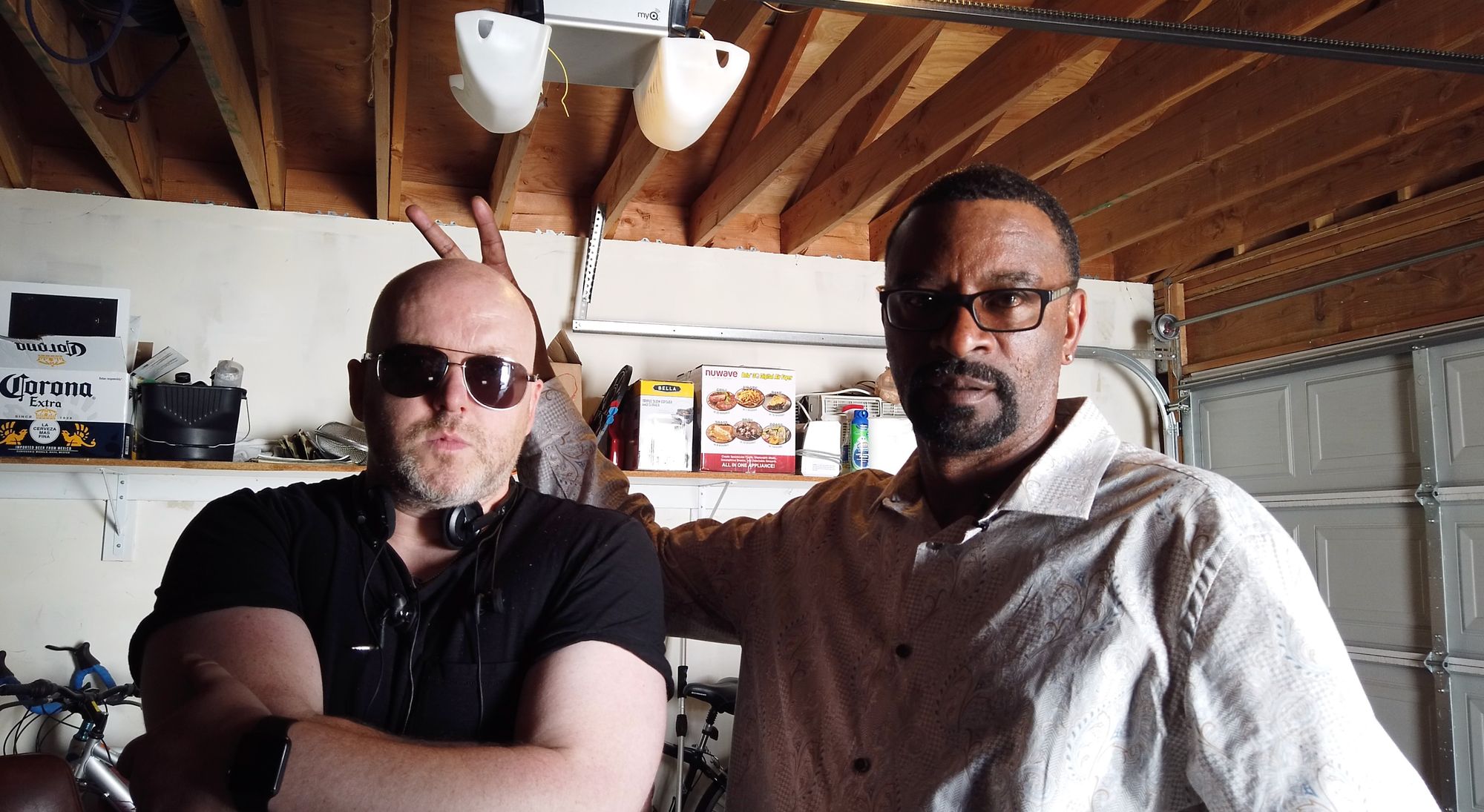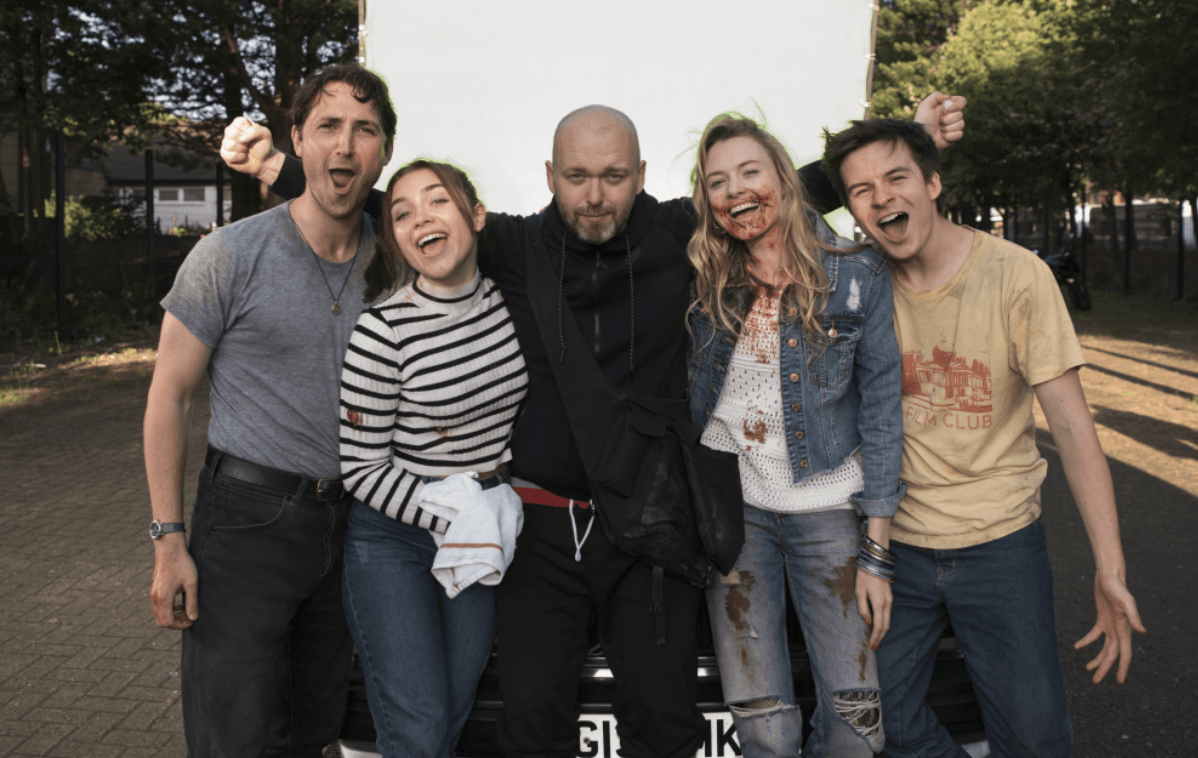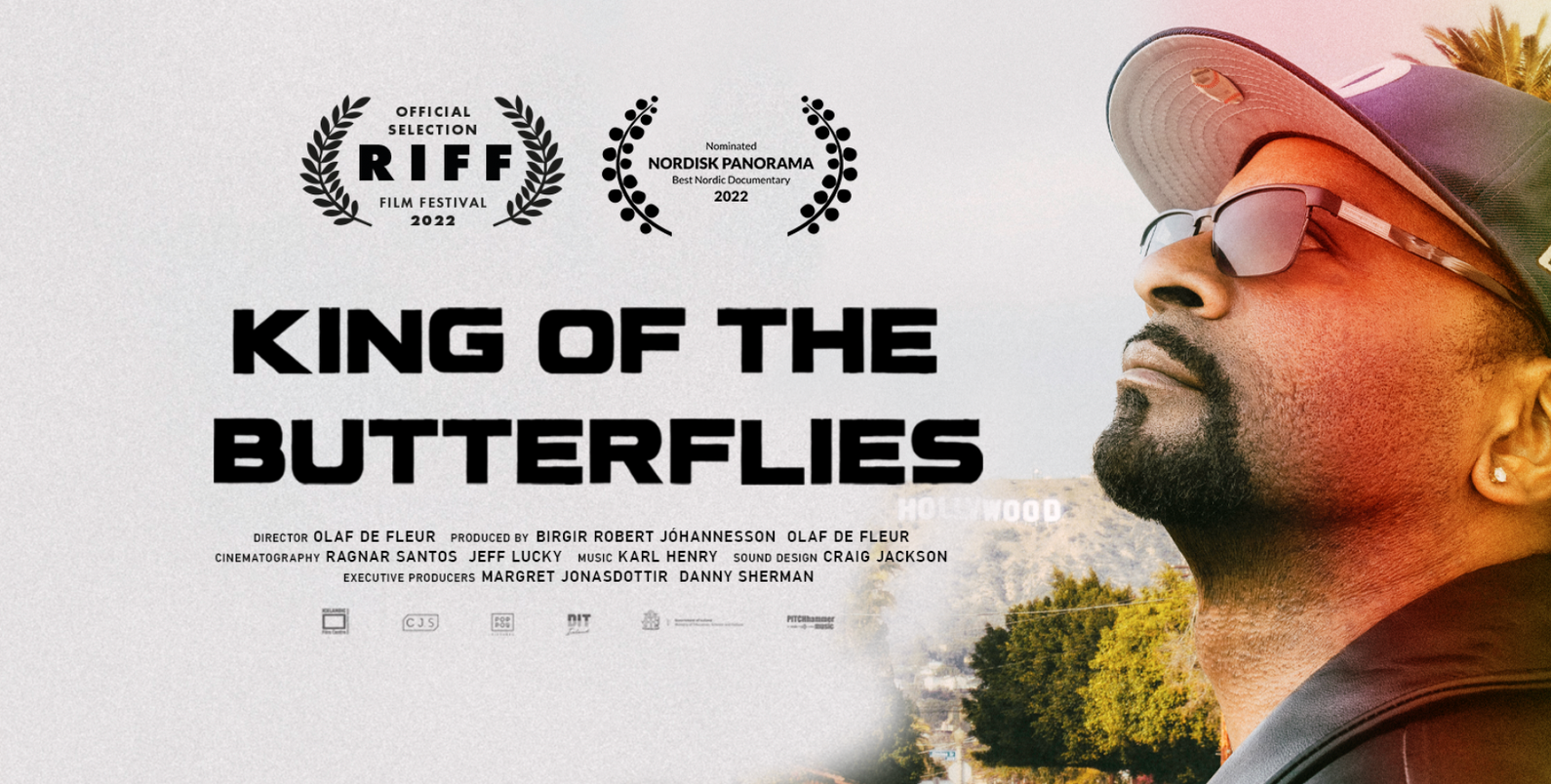Interview: Director Olaf de Fleur on his Icelandic roots, mixing genres, and his emotional new doc ‘King of the Butterflies’
Interview by Meghan Cook (The Insider): "I had the opportunity to sit down with filmmaker Olaf de Fleur and Guardian journalist Claire Armistead to discuss the director's early production days, his documentary King of the Butterflies"

Interview by Meghan Cook (The Insider): I had the opportunity to sit down with filmmaker Olaf de Fleur and Guardian journalist Claire Armistead to discuss the director's early production days, his documentary "King of the Butterflies," which was an official selection for Reykjavík International Film Festival. See original interview link below.
Meghan Cook (Insider): Have you had a chance to see any films at the festival, or have you been mostly working?
Olaf de Fleur Johannesson: No, not seen. I’m on a retina diet, so I don’t put anything in my eyes. [laughs] No, no, but without joking, I have not seen a lot of stuff, because I like to keep it…
Claire Armistead (The Guardian): Fresh?
Olaf de Fleur: Fresh.
CA: That’s what a lot of writers say.
Olaf de Fleur: Yes, writing and filmmaking. They’re similar muscles.
MC: Are there any films that you’ve seen recently? That you broke your own rule for?
Olaf de Fleur: I never remember the answer when I’m asked like this. Usually, it takes about thirty seconds and then the subconscious comes to help.
CA: So you’re mostly documentaries or…?
Olaf de Fleur: Both.
CA: How do you balance them? I’m very interested in both people who make fiction and documentaries. Does it come out of a different part of your brain?
Olaf de Fleur: I think it does. I almost describe it as, every time I make a film it’s like waking up in the middle of a dream. So I find myself suddenly with a camera in the Philippines. Suddenly there, suddenly here. It’s always been like that.
CA: Do you mean you decide whether it’s going to be fiction or nonfiction after?
Olaf de Fleur: I mean, sometimes I mix the genres.
CA: I’m interested in that as well. We just saw a nice little short film that mixed a concert tour with a love story interposed in it (author’s note: The short film was Gabriel Azorín’s The Noise of the Universe). And we thought that was very interesting.
Olaf de Fleur: Right, right. To put it in human language, instead of a dream…so when I started making films I started with what is called “stupid courage.” I love that phrase. I just started making a couple documentaries in 2003 and I was very lucky not to go bankrupt. I kind of accidentally learned the craft, learned to produce, and write, and direct.
I went to AFI in Los Angeles one day and took a day tour there. I asked “Where are the students?” while walking the campus. And they said that they’re here, doing films 24/7. And I thought, well, I’ll just go back to Iceland and save the money and do films 24/7 on my terms.
And then I started making feature films — comedies — and then I did a mixed genre in the Philippines: The Amazing Truth About Queen Raquela. That was done with one very bad camera and one very bad microphone.

The market didn’t want a documentary. So I spent two years traveling around Europe, and everyone said, “What are you doing, Olaf?” So I was angry and I went to the Philippines and I wrote this film about these young women who were in a man’s body who wanted to have another man love them. Which is kind of its own thing, that’s the beauty of it.
And then, I shot the film all around the world. I kind of chased the whole thread that they were in. And then I finished the film and it won a lot of awards. One in Berlin – Best Film – and it launched my career. And then I started making a couple crime films and those got picked up in Los Angeles, into a remake now with Amazon Prime that has gone through several stages.
MC: Congratulations.
Olaf de Fleur: Thank you. So the original meetings there…When I went to Los Angeles in 2011 I got a manager and an agent, and started working.
MC: Is that when you met Darryl [Francis] for the first time?

Olaf de Fleur: Yeah, so somebody asked me, “Would you like a driver?” And I said, “I guess” since I don’t know how to drive over there. And they said, “I got somebody for you.” Then I’m getting picked up from the airport by this black gentleman with a tear under his eye. In certain lighting conditions he looked like Snoop Dogg when I first met him. And he didn’t say anything for the first few days. Later I would understand that he was afraid to lose his job.
And then after two days, he couldn’t contain himself. I’m on my phone, trying to make it in Hollywood [laughs] and then I hear his voice: “This is the cemetery.” I see these white crosses come up, like a metaphor for my career. And then I look at Darryl and he nods his head and says, “But you gotta die to get in there.” And I was like, I love this person.
So ever since that moment, I would go to L.A. every year, sell some ideas and stuff. But I always made sure I had Darryl with me because he would tell me jokes. It takes about an hour to get to a meeting and he massages you up. And then little by little I became more prolific, did a lot of films, and the last film I did was in 2016 for Netflix. A horror film called Malevolent with Florence Pugh.

So after that, I told myself: “Shut up, stop doing.” So I shut up and stopped doing anything. I don’t know for whatever reason but I started reading and writing again. Just quietly, because I was fatigued. And out of that I found a lot of strange kung-fu teachers in the mountains of social media and got trained in all kinds of things. Mainly because I wanted to re-establish communication with myself and to honor my experience.
And out of that thought, I was traveling with Darryl in 2018 to yet another meeting to pitch a galaxy far, far away. I just thought, I’ll go to Englewood and camp there for two years with a camera. Because he was trying to write a script and everybody is familiar with procrastination. He wrote this script in prison and it got sold as soon as he came out. But then he couldn’t write for 10 years out of prison. So he had been talking to me for about 10 years and I was like, “Let’s just film it, and make you accountable.”
So we did that, and I would hold the camera and keep it intimate sometimes. And I started to realize that this was a metaphor, metaphor, metaphor, metaphor. Not only about procrastination but to put it dramatically, our last dance for attention. Darryl is a reflection of that. He has all of this trauma. People who have decent lives have hidden, camouflaged versions of PTSD. It kind of lurks there and takes us away from our dreams.
Darryl was that. Stupid courage. David vs. Goliath. So I kind of figured out that theme while I was working with him. And that’s why it was important to meet people like you two. Because this is a film that is not very marketable. But…
MC: It was an important film for you to make.
Olaf de Fleur: Yeah. In a “don’t let it slip away” kind of thing.
CA: And what does Darryl think? Has he seen it?
Olaf de Fleur: Many times. I’ve edited it for about three years and this is the Sabbath cut. I just wait until it’s congruent and the body has a structure. He’s seen all of them and he loves them. He’s a big supporter. There are a lot of gifts in there.
CA: Did you ever have a feeling of exploiting him? Of putting him in any danger?
Olaf de Fleur: I didn’t worry about that because…it’s a film about him. I decided early on, this film is not going to be about the crime that he was put in prison for. It’s not a crime film. This is a film about, as Darryl put it: “Two idiots in the world with a camera.”
CA: But you do reveal the crime in some way.
Olaf de Fleur: Yeah, yeah. I don’t go Freudian on it, but it is in black and white because I’m putting it far away, in 1982.
MC: You wanted to create distance?
Olaf de Fleur: Yes. And you both are about to see the film?
MC: Yes. We only have three days here, and I say this so sincerely, if I was going to see anything it was King of the Butterflies. I circled it three times in my program because it seemed like the perfect marriage of comedy and film for me. I know as a writer, and someone in a comedy community, how hard it can be to create and how easy it is to self-criticize.
Olaf de Fleur: Spot on. We all doubt ourselves. It’s not personal. We know that intellectually. It’s just a whole other thing of trying to communicate to yourself. It feels like every other day is a custom job when it comes to inadequacy. Because you can’t talk your way out of it. So I do train people quite a bit in writing, but it’s a lot of them fixing that [feeling].
CA: Do you teach mainly here?
Olaf de Fleur: No, so in Covid, I started doing all these filmmaking courses for Skillshare. So five courses there, with around ten thousand people taking them. And out of that I thought, in the spirit of the film about Darryl, I call it a social service. So every for every class I teach twenty people for free around the world. It could be a 50-year-old with a camera in North India or a politician in Los Angeles. And I just love doing it. Because speaking to everyone, about creativity, it helps me with my own work and keeps me from being complacent. You think you know something and then you meet all the white belts and then you really learn something.
CA: So what is your community of filmmakers? Do you have a peer group? Because you said you don’t like to go and watch films, fair enough, but do you have a sense of longing for a community with other people working in film? Or an intellectual community?
Olaf de Fleur: I would say that just very broadly, my team…I have three or four people. We meet up and support each other. But in terms of a film community I describe them as pluses and minuses. Similar to not watching too many films, after you gain your experience, I would say isolate a little bit so you keep your quirkiness.
I like switching it up. I just finished a sci-fi novel. I’ve been working on it for five years. But there is a little community of writers I found in the US. I guess that’s where my community is: broken writers. [laughs] Like we call each other and say, “It’s hard writing.” And I say, “Yeah. It’s really hard writing.” And we share a little bit. We don’t read too much, because we don’t want to subject each other to that, but we do a little bit. And now I have the confidence to write a novel, a children’s book, and do a documentary in Iceland.
MC: So you’re returning to Iceland to film here?
Olaf de Fleur: Right, I have several projects: a novel, children’s book, self-defense documentary…
CA: Is the children’s book illustrated?
Olaf de Fleur: Yeah, I could show you some pictures. I started playing as this monster for my step-daughter, it was a desperate step-father kind of thing. She said, “I want to be a monster, how do I go to monster school?” And then I started BS-ing: “Well, you put a white cross on your forehead, you jump up to the sky, pass the stars, until you wind up on a wide beach where you will see a school. You put your hand on the monster school door, and if you’re a real monster you’ll put the key in the big oak tree with red leaves…
CA: That’s the fun of reading a children’s book is that you kind of have to perform it as well.
Olaf de Fleur: That’s the thing. Because of her, I figured it out. You were talking about a community. Kids, friends, other writers…I find community in the strangest places.
MC: Because you’re doing all of these projects at once, do you find yourself traveling a lot? Are you staying in America right now, or mostly in Iceland?
Olaf de Fleur: Mostly in Iceland. But I do go to L.A. once a year to say hi and get some sun.
CA: With your varied portfolio, how do you get funding? It must be quite confusing for backers. They might want you to go and do another horror film.
Olaf de Fleur: Right, I just keep a tent down. Right now, I’m alone writing a lot. And if I do a film, I tent up. It’s project dependent. We do have a nice funding system here in Iceland. But it’s not easy. You kind of just have to, with experience, know when to rely on your community and when to work alone.
MC: Did you have a hunger from an early age to work elsewhere? What brought you back to Iceland?
Olaf de Fleur: I was born with a passport in my hand…But it is true, sometimes something pulls you like a magnet and you have to go somewhere and stay somewhere and do something. And you don’t know why. But by traveling you really appreciate the energy here.

Original Interview link: https://matchcutreviews.wordpress.com/2023/01/30/director-olaf-de-fleur/?fbclid=IwAR21dWxsZl9GXHFrMTfnYjwh9eZwrCTyInrXhpIj1okwpCKo0Zmg-QlGLtA
